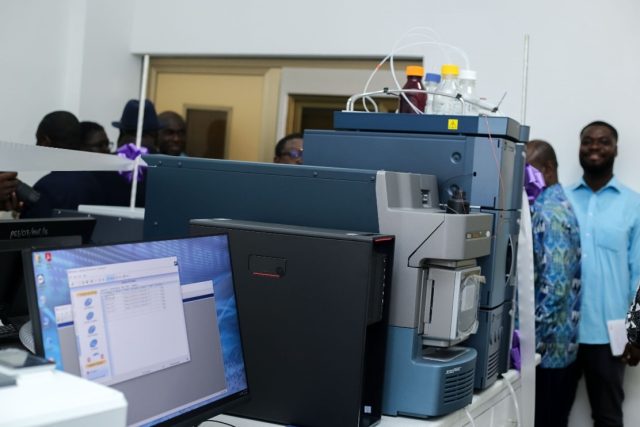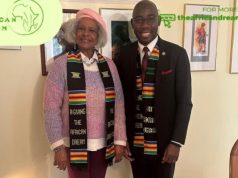By Kizito CUDJOE
The Ghana Standards Authority (GSA) has acquired cutting-edge laboratory equipment valued at over €530,000.
The investment is part of support provided by the German Cooperation under the Invest for Jobs programme. The programme aims to create up to 100,000 quality jobs across eight African countries, among other objectives, within a partnership project.
The support is expected to facilitate the establishment of a certification scheme and testing protocols for organic produce within the country.
The equipment set, which includes a Liquid Chromatography-Mass Spectrometry (LC-MS) system, a nitrogen generator, a centrifuge and a complete manifold, is expected to enhance the analytical capabilities of the GSA. This will facilitate the promotion of food safety and quality standards.
During a brief ceremony in Accra to unveil the equipment, Prof. Alex Dodoo, the Director-General of GSA, stated that the authority’s receipt of the equipment signifies a new era for organic certification and agricultural standards.
He noted that the establishment of the organic certification scheme and testing for organic produce, along with the arrival of the machines, demonstrates GSA’s commitment to enhancing the livelihoods of farmers, safeguarding consumer health in addition other objectives.
“The objectives of this scheme are clear. We aim to set forth stringent standards for organic farming practices and Global GAP certification requirements, thereby empowering our local producers to meet international standards 5 of quality and sustainability,” he stated.
By bridging the gap between local practices and global standards, he said: “We are paving the way for our farmers to access international markets while removing trade barriers that have hindered the growth of our agricultural sector. Agriculture, as we all know, is the backbone of our economy, contributing significantly to our GDP.
“Therefore, it is incumbent upon us to strengthen this vital sector by instituting robust conformity assessment activities such as organic and Global GAP certification schemes.”
With the installation of advanced LC/MS/MS equipment for testing organic produce, he stated that GSA will be empowered to conduct precise and comprehensive analyses, ensuring the authenticity of organic products.
Speaking on behalf of the Deutsche Gesellschaft für Internationale Zusammenarbeit (GIZ), Mr. John Duti noted that the German Government is proud to support the GSA in its mission to uphold quality standards and promote regulatory compliance.
“Analytical capabilities are integral to ensuring the safety and reliability of agricultural products and services. By providing this high-resolution state-of-the-art equipment, GIZ aims to empower GSA to fulfil its mandate effectively and contribute to the overall well-being of the Ghanaian economy,” he said.
As part of the support, he disclosed that 10 GSA employees will be trained in organic and global GAP as scheme managers and auditors. This is expected to enable GSA to offer certification services at a reasonable rate, especially considering the high cost of international certification in the market.
Mr. Duti envisions that over 100 agribusiness SMEs will benefit from utilising the procured testing equipment and certification services.
It was indicated that the support initiative aligns with the broader commitment of the German Cooperation to advance sustainable development goals, including food security, just transition, trade facilitation, public health and economic growth.
Under the ‘Invest for Jobs’ brand, the German Federal Ministry for Economic Cooperation and Development (BMZ) has assembled a package of measures to support German, European and African companies in investment activities with a significant impact on employment in Africa.
The Special Initiative ‘Decent Work for a Just Transition’ offers comprehensive advice, contacts and financial support to overcome investment barriers.
The development objective is to collaborate with companies to create up to 100,000 quality jobs and to enhance working conditions and social protection in its eight African partner countries, including Côte d’Ivoire, Egypt, Ethiopia, Ghana, Morocco, Rwanda, Senegal and Tunisia.
The special initiative is making a targeted contribution to shaping the socio-ecological transformation of the private sector in line with a just transition, and to creating more and better jobs for women.
















